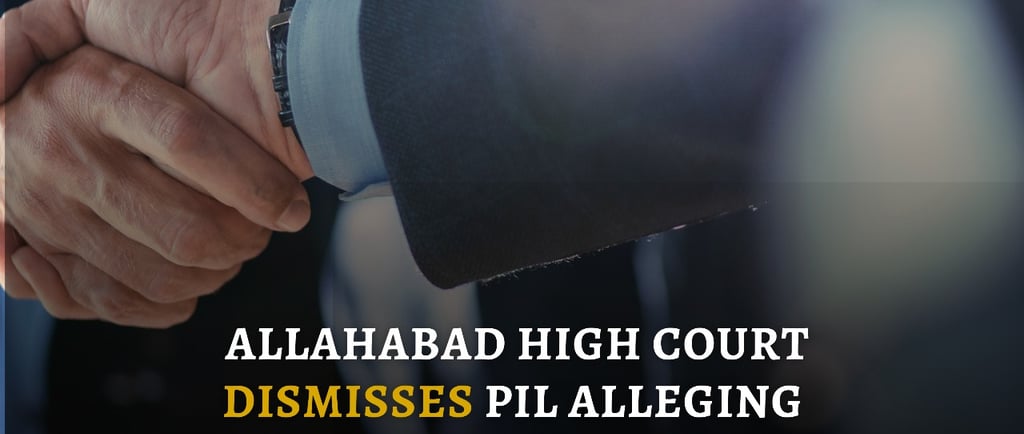Allahabad High Court Dismisses PIL Alleging Manipulation in NEET 2025 Physics Paper; Cites Lack of Credentials and Maintainability
In a significant decision, the Allahabad High Court (Lucknow Bench) dismissed a Public Interest Litigation (PIL) filed by Deenbandhu Samgra Swasthya Avam Siksha Shodh Sansthan, which sought directions to quash the physics paper of NEET 2025, stay the declaration of results, and order a re-examination on grounds of alleged question paper manipulation and out-of-syllabus questions favoring certain coaching institutes.
6/30/20253 min read


The petition, filed through the Trust's chairman, Shafiullah, alleged that certain questions in the NEET 2025 physics paper were out of syllabus, directly lifted from materials posted by coaching institutes such as 'ALLEN' and 'Aakash,' and thus benefitted students of those coaching centers, causing serious prejudice to other aspirants. The petitioner further sought an inquiry into this alleged scam, abolition of the 15% All India Quota in state seats, and publication of response sheets of all examinations including NEET, JEE, and IIT as per the provisions of the National Education Policy.
The Division Bench comprising Hon'ble Justice Saurabh Lavania and Hon'ble Justice Syed Qamar Hasan Rizvi heard the counsels for the petitioner and respondents, including the Union of India represented by the Additional Solicitor General of India, and counsels representing the National Testing Agency (NTA) and the Director General of Medical Education and Training, Uttar Pradesh.
Key Grounds of the Petition:
Certain physics questions in NEET 2025 were outside the prescribed syllabus, benefitting only students from coaching institutes which had published these questions in advance.
Allegations of manipulation and scam in the physics paper necessitating a stay on the results and re-conduct of the physics exam in the interest of fairness and justice.
Huge variation in marks of students across states in NEET results indicating irregularities requiring detailed inquiry.
Abolition of the 15% All India Quota in state seats as being allegedly violative of Article 14 of the Constitution.
Directions to make all exam results and response sheets public as mandated by the Education Policy 1986.
Respondents' Arguments and Court's Observations:
Raising preliminary objections, the Additional Chief Standing Counsel and other respondents argued that the PIL was not maintainable due to the following reasons:
The petitioner, a Trust, had not disclosed credentials as required under Sub-Rule (3-A) of Rule 1, Chapter XXII of the Allahabad High Court Rules, 1952.
There was no resolution or authorization on record empowering the Chairman to file the petition on behalf of the Trust.
The PIL did not demonstrate any genuine public interest, nor did it relate to marginalized or disadvantaged sections unable to approach the Court independently.
The Court examined these objections in detail, citing binding precedents including State of Uttaranchal v. Balwant Singh Chaufal, (2010) 3 SCC 402, and Ashok Kumar Pandey v. State of West Bengal, AIR 2004 SC 280. It noted that credentials and locus standi are essential in PILs to prevent misuse of judicial process and frivolous petitions.
The Court emphasized that the requirement under Sub-Rule (3-A) is not merely procedural but substantive, ensuring that persons filing PILs demonstrate genuine credentials, expertise, or connection to the public cause. The word 'credentials' was explained using authoritative legal dictionaries to mean proof of expertise, authority, or connection to the cause.
Referring to Bandhua Mukti Morcha and Balwant Singh Chaufal, the Court underscored that while locus standi in PILs has been relaxed in certain contexts (like cases involving downtrodden, bonded laborers, environmental issues), the present petition did not involve any such cause. Rather, it was filed by a private Trust without demonstrating expertise or connection to NEET examination issues, or any prima facie public interest.
Court's Ruling:
The Bench held that:
The petitioner failed to file credentials and a precise affidavit explaining its connection to the public cause as required by the Rules.
No resolution or authorization existed to file the petition on behalf of the Trust.
The matter did not relate to disadvantaged or marginalized sections unable to approach the Court themselves.
Thus, the Court dismissed the PIL at the threshold for want of maintainability and failure to comply with the mandatory procedural requirements, clarifying that it had not examined the merits of the alleged irregularities in NEET 2025.
Conclusion:
This judgment is a reiteration of the principles governing maintainability of PILs in India, emphasizing the necessity of strict compliance with procedural rules regarding disclosure of credentials and locus standi. The Court cautioned against misuse of PIL jurisdiction, which is intended for protection of fundamental rights of marginalized groups or matters affecting the larger public interest.
In dismissing this PIL, the Court has reinforced that mere allegations against high-stakes examinations like NEET, without credible factual foundation or compliance with procedural rules, cannot justify judicial intervention, especially where massive logistical, administrative, and policy implications are involved.
